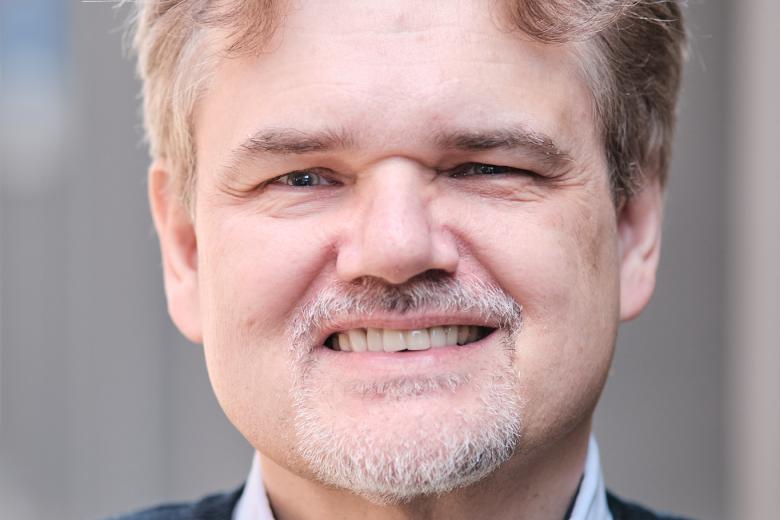Rainbows and brains
Professor Kai Jonas is the Faculty of Psychology and Neuroscience’s first chair of “Applied Social Psychology with special focus on LGBTQI+ Diversity and Health”. In the run-up to his inaugural lecture, he reflects on difficult conversations, progress, and how he uses psychology to tackle the still very relevant challenge of HIV.
Pride month is about to end, but Professor Kai Jonas remains focused on the wellbeing of the LGBTQI+ community – in his research and beyond. “We need the fearless curiosity to have open conversations and the generosity to allow people to make mistakes.” Jonas stresses that university should be a place where people have the space to learn – not just academically.
“I often tell my students that not getting recognised for all their beautiful individuality isn’t necessarily due to discrimination; there’s a larger issue at play.” He is referring to the sense of disillusion that comes from seeing the Global North’s cultural promise of individualism – of having life tailored to oneself – broken. “Of course, I’m not legitimising discrimination,” but he warns against viewing individual happiness as monolithic. “We live in societies and communities – compromise is necessary.”
Perilous path to normality
“This chair being a point of pride for the university is a sign of how far we’ve come in the last decades,” says Jonas. Yet substantial challenges remain. Hesitant to generalise lest he diminish the individuality of experience, he nevertheless points to internalised homo-negativity as an overarching problem in the LGBTQI+ community. “There are more rights and acceptance now but discrimination on the path to gradual normality remains. Everyone is different but we all have wounds to heal – and that can have downstream effects.”
Jonas also points to the constant need to warily fathom the borders of a protean and precarious ‘normal’. “How cautious do I have to be to be safe? How authentic can I be? It’s like a programme running constantly in the background. In some ways it’s similar to the constant vigilance that Jewish people report.” Being an openly gay professor, Jonas is inevitably a role model and an indicator of what constitutes normal now. “I wasn’t aware of that at first but it’s very helpful for LGBTQI+ students to see themselves represented. You see that ‘people like you’ can make it in this system.” Jonas accepts that responsibility gladly. “I didn’t have that when I studied.”
Sometimes it’s important to wave your flag
As a young researcher, a mere 20 years ago, Jonas received the advice to “keep it under the radar” and focus on non-queer subjects while establishing himself – by a gay professor. “I only changed my research focus once I’d received tenure. Pragmatically speaking, it was the right thing to do at the time but I think this is changing right now.” That he would not give any of his mentees similar advice is certainly promising. However, he points out that acceptance occurs in bubbles and is by no means linear and irreversible. “You see reactionary backlashes, also in places in the US and Europe.”
An innocent party to some, Pride remains a march for rights and acceptance. “I’m focused on my research as I have been in the decades before, but as I also said during my in inaugural lecture as President of the European Association of Social Psychology: Sometimes it is important to wave your flag.” Jonas is very aware that of his relatively privileged position: as a white cis man working in academia, he’s not among the most vulnerable letters.
Aristotelean rainbow
The debate on the usefulness of categories and letters has been going on for years. “The tendency for shoeboxing people is a distinctly US American approach, driven by a culture where being a member of certain minority categories gives you certain rights. This is not a natural fit with the European context, but we’ve embraced it nevertheless.” LGBTQI+ is not a perfect umbrella-category – not only because it doesn’t really roll off the tongue. “Trans people identifying as straight women for example might not share the struggles and experiences of cis gays and lesbians.”
Jonas welcomes adding more letters to the category in the name of inclusivity, “but you have to ask critically how much sense it makes to have those categories, conceptually and practically, if more and more people have difficulties identifying with them. Vague delineations in an attempt to not exclude are good; at the same time, as a psychologist, I tend to think that if there’s no difference between A and B, then we shouldn’t be using A and B...”
More letters: HIV, PrEP, FMRI, EEG, TMS, etc.
Whilst proudly a ‘pink professor’ and willing to be a role model, Jonas makes a difference in principle through his research. A mathematician and social scientist by training who got into psychology at PhD level, he uses a multimethod approach spanning Bayesian modelling to interviews and neurocognitive diagnostics. “I really enjoy the general vibe and the collaborative, interdisciplinary approach of UM.” At the same time, Jonas travels a lot and has many international collaborators, in particular in Asia.
“We try to understand human motivation, decision-making and risk perception, especially in the context of HIV. PrEP [Pre-Exposure Prophylaxis - taken to prevent contracting HIV] is obviously a great breakthrough but pills don’t fly into patients’ mouths by themselves; behavioural sciences can play a big part in saving lives there. So we’re trying to investigate the impediments on the way to eradicating HIV.”
That is also where mathematical modelling and qualitative methods like interviewing come in. “If you’re only looking at national statistics, you won’t understand the situation of groups or individuals. A new set of much more precise geospatial and temporal analytical tools is needed. The canons have done their job, but now we need a laser. We expect that reaching the last 5-10 percent of those with HIV will be as difficult as the first 90 percent.”
Beyond prevention, Jonas also uses neurocognitive approaches to identify the long-term effects of HIV on the brain. “People living with HIV, if virally supressed, have a near-to-normal life expectancy but we see an increase in a number of comorbidities, among them a decrease in higher-level brain functions. It’s difficult to disentangle neurocognitive ageing caused by a now defunct antiretroviral medication from the neuro-ageing caused by your body fighting HIV. We don’t have a group of 90-year-olds with HIV, so there are still many open questions.”
The phenomenon is difficult to diagnose. FMRI [Functional magnetic resonance imaging] is a very precise but prohibitively expensive method. “It makes for fascinating science but even in a Western context is too costly to help a large number of people.” Together with a PhD student, Jonas is devising EEG [Electroencephalography] and TMS [Transcranial Magnetic Stimulation] based methods to assess the degree of cognitive degeneration. “The latter also has potentially curative effects and luckily there are many TMS specialists at UM, so we’re researching that right now.”
Also read
-
How do we imagine? ERC Advanced Grant for Prof. dr. Rainer Goebel (FPN)
FPN’s prof. dr. Rainer Goebel has been awarded an ERC Advanced Grant of € 2,5M for his research project Reading the Mind’s Eye: AI inspired personalised brain models of mental imagery. Goebel is among 255 researchers (out of 1829 applications in all domains) in Europe to receive the grant, and he is...

-
Eleonora Broggi - What happens in the brain of someone with a neurodevelopmental condition
What happens in the brain of someone with a neurodevelopmental condition? Eleonora Broggi, an alumna of the bachelor Biomedical Sciences at Maastricht University, is investigating brain patterns in autistic people at King’s College London. Read how Eleonora uses Biomedical Sciences for her career in...

-
A sustainable world tour as sabbatical
Carolin Muschalik and Lukas Figge-Muschalik met in 2014, when Lukas was doing a PhD and Carolin was finishing her master’s at Maastricht University. One year ago they left on a trip around the world, intending to explore, enjoy life and satisfy their curiosity, but also to contribute to a more...
